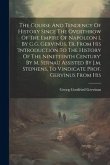Explore the fascinating depths of historical inquiry with Richard Whately's "Historic Doubts Relative To Napoleon Buonaparte." This thought-provoking work delves into the very nature of historical evidence, using the life of Napoleon I, Emperor of the French, as its intriguing case study. Whately masterfully dissects the accepted narratives surrounding Napoleon Bonaparte, raising compelling questions about the reliability of historical accounts and the potential for doubt, even concerning seemingly well-documented events. A cornerstone of the philosophy of history, this book challenges readers to consider how historical narratives are constructed and the extent to which they can be trusted. Journey through French history and military strategy as Whately applies his keen intellect to the legend of Napoleon, offering a unique perspective that remains relevant today. Whether you're a student of history or simply intrigued by the complexities of the past, "Historic Doubts Relative To Napoleon Buonaparte" provides a stimulating and enduring exploration of historical doubt. This work has been selected by scholars as being culturally important, and is part of the knowledge base of civilization as we know it. This work is in the public domain in the United States of America, and possibly other nations. Within the United States, you may freely copy and distribute this work, as no entity (individual or corporate) has a copyright on the body of the work. Scholars believe, and we concur, that this work is important enough to be preserved, reproduced, and made generally available to the public. We appreciate your support of the preservation process, and thank you for being an important part of keeping this knowledge alive and relevant.
Bitte wählen Sie Ihr Anliegen aus.
Rechnungen
Retourenschein anfordern
Bestellstatus
Storno









